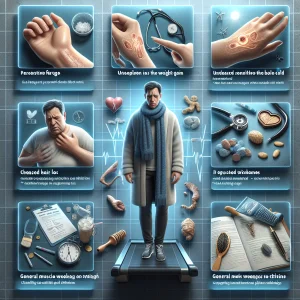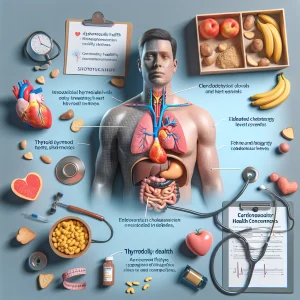Uncover the Critical Health Risks Associated with Hypothyroidism in Men
Hypothyroidism in men represents a serious health concern stemming from the thyroid gland being unable to produce sufficient amounts of crucial hormones, specifically thyroxine (T4) and triiodothyronine (T3). These hormones are essential for countless bodily functions, including regulating metabolism, managing energy levels, and maintaining overall vitality. While hypothyroidism affects both genders, men often face distinctive symptoms and challenges that can drastically reduce their quality of life. Therefore, a comprehensive understanding of this condition is imperative for effective treatment and management strategies.
Identifying the unique characteristics of hypothyroidism is crucial for implementing actionable treatment and management strategies. Men frequently overlook the signs of this condition, often attributing their symptoms to stress, lifestyle changes, or the aging process. Such misinterpretations can lead to ongoing discomfort, additional health complications, and a substantial decline in overall well-being if not promptly addressed. Thus, early detection is vital for achieving optimal health outcomes and ensuring a fulfilling quality of life.
The causes of hypothyroidism are varied and may include autoimmune disorders such as Hashimoto’s thyroiditis, side effects from medications, or complications from radiation therapy. Timely identification and understanding of symptoms are critical for early intervention, which can lead to improved health and a higher quality of life.
Essential Information About Hypothyroidism That Every Man Should Understand
- Hypothyroidism in men signifies inadequate production of thyroid hormones, resulting in a range of physical and psychological health challenges.
- Physical manifestations often include persistent fatigue, unexplained weight gain, hair thinning, and decreased muscle strength. Health risks associated with this condition include elevated cholesterol levels, an increased risk for heart disease, and potential onset of diabetes.
- The emotional and psychological repercussions of hypothyroidism in men can lead to depression, anxiety, and cognitive difficulties, significantly impacting overall quality of life.
- This condition can adversely affect sexual health, causing reduced libido, erectile dysfunction, and possible fertility problems.
- Men facing hypothyroidism frequently encounter difficulties with weight management, as the condition lowers metabolic rates, complicating weight loss efforts and necessitating tailored dietary and exercise strategies.
 Identifying the Physical Symptoms and Health Risks Linked to Hypothyroidism
Identifying the Physical Symptoms and Health Risks Linked to Hypothyroidism
The physical symptoms associated with hypothyroidism can vary widely among men. Those affected often report chronic fatigue, unanticipated weight gain, heightened sensitivity to cold, and widespread muscle weakness. You might feel drained even after a full night’s sleep or struggle to lose weight, despite adhering to a healthy diet and maintaining a consistent exercise routine.
These troubling symptoms can lead to self-doubt regarding your health choices and fitness endeavors. Furthermore, hypothyroidism might reveal itself in less obvious ways, such as skin texture changes—like dryness or pallor—and increased hair loss or thinning. Timely intervention for these concerns is paramount for effective management and improved health outcomes.
Additionally, a slowed heart rate may occur, contributing to feelings of lethargy and diminished stamina during physical activities. The cumulative effects of these physical symptoms can significantly disrupt daily life and overall functionality. Therefore, seeking medical advice becomes essential if you suspect that hypothyroidism may be impacting your health.
Examining the Mental and Emotional Challenges Associated with Hypothyroidism
The mental and emotional effects of hypothyroidism often go unnoticed, yet they deserve considerable attention. As thyroid hormone levels decline, you may experience mood swings, intensified feelings of depression, or increased anxiety. These emotional fluctuations can lead to irritability and fatigue, straining personal relationships and detracting from overall life satisfaction.
Research underscores the intricate relationship between thyroid function and mental health, highlighting the need to acknowledge this connection for effective management. Cognitive functions may also be compromised due to hypothyroidism, resulting in a phenomenon often referred to as “brain fog.” You might find it difficult to concentrate, forget small tasks, or feel mentally sluggish, especially in fast-paced environments that demand clarity.
Recognizing these cognitive and emotional symptoms as vital components of hypothyroidism is essential for advocating appropriate medical interventions. For further insights into the connection between hypothyroidism and mental health, consider exploring resources available at the Mayo Clinic.
 Understanding the Significant Impact of Hypothyroidism on Men’s Sexual Health
Understanding the Significant Impact of Hypothyroidism on Men’s Sexual Health
Hypothyroidism can profoundly affect sexual health in men, leading to a range of complications. Lowered levels of thyroid hormones may contribute to diminished libido, erectile dysfunction, and even infertility. You may notice a significant decline in interest in sexual activity or encounter obstacles in achieving or maintaining an erection.
These sexual health issues can be distressing, often resulting in feelings of inadequacy, frustration, or anxiety within intimate relationships. The hormonal imbalances caused by hypothyroidism can also interfere with testosterone levels, complicating the intricate dynamics of sexual health. Low testosterone may lead to increased fatigue, mood swings, and decreased sexual desire, creating a challenging cycle that can be hard to break.
It is essential to discuss these sexual health concerns openly with your healthcare provider to explore effective treatment options aimed at restoring both thyroid function and sexual well-being, ensuring a holistic approach to your overall health.
Effective Strategies for Managing Weight with Hypothyroidism
Weight management presents unique challenges for men diagnosed with hypothyroidism. The metabolic slowdown associated with low thyroid hormone levels can hinder your efforts to achieve or maintain a healthy weight. Despite regular exercise and a balanced diet, you may find that losing excess weight feels like an uphill battle.
This ongoing struggle can be disheartening, leading to feelings of frustration or hopelessness regarding weight loss goals. Understanding the relationship between hypothyroidism and weight gain is key to developing effective strategies. Working alongside a healthcare provider can help create a tailored plan that addresses both thyroid health and weight management objectives.
This collaborative approach may involve adjustments to medications, dietary modifications, and the incorporation of specific exercise routines designed to enhance metabolism while considering your energy levels.
 Examining the Link Between Hypothyroidism and Cardiovascular Health Risks
Examining the Link Between Hypothyroidism and Cardiovascular Health Risks
The relationship between hypothyroidism and cardiovascular health is a significant concern for men dealing with this condition. Insufficient thyroid hormone levels can lead to elevated cholesterol levels, thereby increasing the risk of heart disease over time. It is essential to recognize that the fatigue and lethargy commonly associated with hypothyroidism may not only indicate the presence of the condition but could also signal underlying cardiovascular issues that require attention.
Regular evaluations of cardiovascular health are crucial for individuals diagnosed with hypothyroidism. Your healthcare provider might recommend lifestyle changes, including a heart-healthy diet rich in fruits, vegetables, whole grains, and lean proteins. Moreover, engaging in consistent physical activity that aligns with your energy levels can support thyroid function and enhance cardiovascular health. By proactively managing both thyroid health and cardiovascular fitness, you can significantly reduce the risks of further complications.
Understanding How Hypothyroidism Affects Male Fertility
Fertility challenges represent another serious issue related to hypothyroidism in men. Low thyroid hormone levels can disrupt the delicate hormonal balance necessary for sperm production and overall reproductive health. If you are experiencing difficulties conceiving, it is vital to consider how your thyroid function may be influencing your fertility journey.
Effectively managing hypothyroidism through appropriate treatment can improve overall health and increase the chances of successful conception. Collaborating with a knowledgeable healthcare provider who understands the intricate relationship between thyroid function and fertility is critical for developing a comprehensive strategy that addresses both aspects. This may involve regular hormone level monitoring through blood tests and adjusting medications to optimize reproductive health.
Comprehensive Approaches for Managing and Treating Hypothyroidism in Men
Managing hypothyroidism successfully calls for a holistic approach that encompasses regular monitoring through blood tests, careful medication management, lifestyle adjustments, and open communication with healthcare professionals. Blood tests are crucial for diagnosing hypothyroidism, as they evaluate key markers such as Thyroid-Stimulating Hormone (TSH) and T4 levels. Elevated TSH levels generally indicate an underactive thyroid, while low T4 levels confirm the diagnosis.
Following a diagnosis, treatment typically involves hormone replacement therapy utilizing synthetic thyroid hormones, such as levothyroxine. This medication aids in restoring normal hormone levels, alleviating many of the symptoms associated with hypothyroidism. Regular follow-up appointments are essential for assessing treatment effectiveness and making necessary adjustments based on blood test results.
In addition to medication, implementing lifestyle changes—such as a nutrient-rich diet that supports thyroid health through adequate iodine, selenium, and zinc—can be beneficial. Incorporating regular physical activity that aligns with your energy levels can also assist in managing symptoms while enhancing overall well-being. By actively participating in your health management through education, collaboration with healthcare providers, and lifestyle modifications, you can lead a fulfilling life despite the challenges posed by hypothyroidism.
Frequently Asked Questions About Hypothyroidism in Men
What is hypothyroidism in men?
Hypothyroidism in men refers to a condition in which the thyroid gland fails to produce sufficient thyroid hormones, resulting in a metabolic slowdown and a variety of health complications.
What are the common symptoms experienced by men with hypothyroidism?
Symptoms frequently observed in men with hypothyroidism include persistent fatigue, weight gain, sensitivity to cold, dry skin, constipation, muscle weakness, and feelings of depression.
How is hypothyroidism diagnosed in men?
The diagnosis of hypothyroidism in men is established through blood tests that measure the levels of thyroid-stimulating hormone (TSH) and thyroxine (T4) in the bloodstream.
What factors contribute to the onset of hypothyroidism in men?
The primary cause of hypothyroidism in men is often an autoimmune disorder known as Hashimoto’s thyroiditis. Additional contributing factors may include thyroid surgery, radiation treatment, and specific medications.
What treatment options are available for men diagnosed with hypothyroidism?
Men diagnosed with hypothyroidism typically receive treatment through synthetic thyroid hormone medications, such as levothyroxine, to replenish deficient hormones and restore normal thyroid function.
Can hypothyroidism lead to further health complications in men?
If left untreated, hypothyroidism in men can result in complications such as heart disease, fertility issues, and mental health problems. Seeking appropriate treatment is vital to minimize these risks.
This Content Is Sponsored By: Thyroid Testing UK
Hypothyroidism in Men: The Impact On Health Was First Published By https://bloodtest.co.uk
Find Us On Facebook: EZ Blood Tests
The Article: Hypothyroidism in Men: Health Implications Explored appeared first on: https://ezbloodtest.com
The Article Hypothyroidism in Men: Exploring Health Implications Was Found On https://limitsofstrategy.com
The Article Hypothyroidism in Men: Health Implications Uncovered First Appeared ON
: https://ad4sc.com
Comments are closed